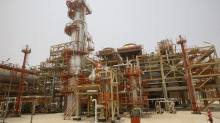Oil prices climb; Iran to halt exports to 6 EU countries
 Oil was well above $101 (U.S.) a barrel on Wednesday after Iran announced it would stop crude exports to six European countries and investors were heartened from positive developments in Europe’s sovereign debt crisis.
Oil was well above $101 (U.S.) a barrel on Wednesday after Iran announced it would stop crude exports to six European countries and investors were heartened from positive developments in Europe’s sovereign debt crisis.The benchmark crude was up 92 cents to $101.66 per barrel on the New York Mercantile Exchange. The contract fell 17 cents to finish at $100.74 per barrel in New York on Tuesday.
Iranian state TV said Wednesday that Tehran had cut oil exports to six European countries in response to sanctions from the European Union which include a boycott of new oil contracts with Iran. No further details were immediately available.
Iran’s oil minister, Rostam Qassemi, said recently that Tehran could cut off oil exports to “hostile” European nations as tensions rise over the Islamic Republic’s nuclear program.
European sales account for about 18 per cent of Iran’s total crude exports and its main buyers include Greece, Italy and Spain.
Adding to the tensions, antagonism between Israel and Iran has escalated following a bomb attack on an Israeli diplomatic target in India and a foiled attack in Georgia.
Israel has accused Iran of waging a covert campaign of state terror that stretched this week to the heart of Asia after a bungled series of explosions led to the capture of two Iranian nationals in Bangkok.
Also boosting prices were positive developments for the European debt crisis, as China confirmed it would continue investing in the safest EU bonds. In Greece, the head of the Conservative party, which along with the Socialists form the governing coalition, made a written commitment to the terms of the second bailout – a key requirement for the process to move ahead and prevent a default next month.
Still, a report edited by U.S. energy trader and consultant Stephen Schork forecasts oil prices will fall due to caution in the U.S. at the gas pump after a report showed January retail sales grew only modestly.
“Consumers are spending, but with higher food prices and new iPhones to buy, they are not spending at the pump,” Mr. Schork said.
You can return to the main Market News page, or press the Back button on your browser.

